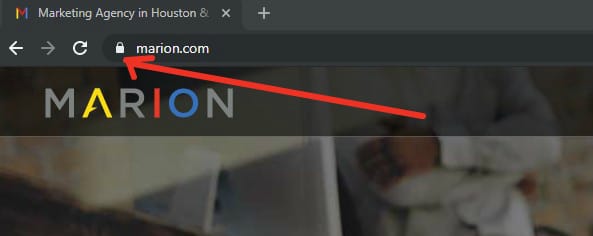What makes a good business website? One of the main components of a great business website is the safety and security of visitors on your site.
SSL, or Secure Socket Layer, enables the website you’re interacting with to exchange encrypted data with the computer or device you’re using. Without encryption, the data you exchange with the website could be read by third parties while in transit.
For example, if you fill out a form on an SSL secured website, the information you typed into the form fields is safe from prying eyes while on its way to the website from your computer or device. Also, transmitted data from the website to another computer (such as a payment processor) is encrypted as well.
How to Tell If You’re on a Secure Website
When you’re on a secure site, you’ll notice the address of the site begins with “https.” Without the secure connection, you’ll see an address that begins with “http” (without the final “s”). Typically, a secure site will also display a lock icon in the address bar. Some websites may only secure the portions of the site that exchange data.

What is the difference? HTTP, or Hyper Text Transfer Protocol, is the standard protocol for transferring data on the Internet. It was invented so that information could travel between computers, in other words, so that you can read this article online. When a site is secured with an SSL Certificate, it can use HTTPS, (Hyper Text Transfer Protocol Secure). After you secure your website with an SSL, computers can scramble the information in transit between them by means of the keys encoded in the certificate.
I Don’t Collect Data – Does My Website Need an SSL Certificate?
Yes, but not for security. For several years now, all websites, whether they include interactive elements like forms, need SSL to capitalize on HTTP vs. HTTPS SEO differences. All things being equal, a secure site will rank higher than a non-secure site. That means if you have an SSL Certificate active on your website, people will have an easier time finding your content.
What Are the Different Types of SSL Certificates?

First, understand the different kinds of SSL certificates to know what you’ll need:
Domain Validation (DV)
A Standard (DV) SSL can range from free to a low per-year fee, depending on how you get it. For example, at MARION, we recommend the websites we host use Cloudflare to protect them from DDoS attacks and for other reasons.
One of the advantages of Cloudflare is free SSL! Learn more about Cloudflare. A DV certificate can be issued once simple electronic verification means such as email, DNS entries or text file uploads to your domain/website are completed. A DV certificate uses the same encryption methods as other certificates.
Organization Validation (OV)
An OV (Organization Validation) certificate offers your visitors information about your company. (Clicking the secure icon in the address bar shows the certificate details and company information.) To obtain this type of certificate you must provide some of your business information to the issuer of the certificate. The issuer then verifies that you are a legal entity before granting the certificate.
The person requesting the certificate must also meet security requirements to prevent rogue certificate issuance. It normally takes 1 to 3 business days to obtain an OV Certificate. Prices for OV Certificates are higher than DV certificates but are still quite reasonable.
Extended Validation (EV)
An EV (Extended Validation) certificate displays your company name prominently on the address bar. EV certificates were created to help website users feel confident that the website is genuine and not an imposter site, such as a website used in Phishing attacks. To obtain an EV certificate you must pass a more stringent set of requirements and provide more information. Prices for EV Certificates are significantly higher than other kinds of certificates, because there is more human involvement in issuing these types of certificates.
What an SSL Is Not
An SSL is only one part of overall website security management. An SSL protects data in transit. It does not protect your stored data or protect your website from malware, hacked passwords, DDoS attacks … the list goes on. Website owners must also make sure their sites are current with security best practices, a subject for a future MARION blog post.
Contact MARION for SSL Setup Help Today
Our Houston and Austin web design team has years of experience designing, developing, and securing business websites for customers like you.
Contact us today to learn more about how we can improve your marketing process!

